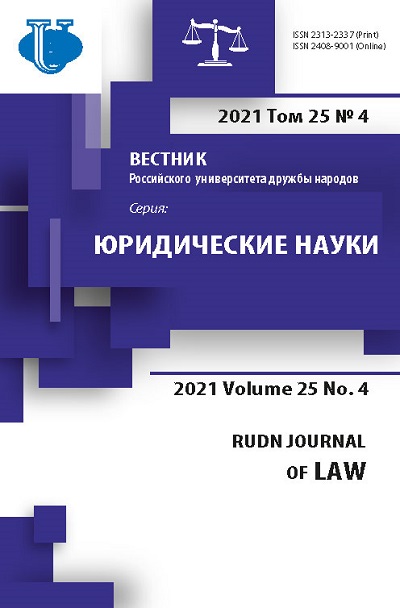Epistemological issues of research of the subject and object of legal protection in genomic relations
- Authors: Semyonovikh A.E.1
-
Affiliations:
- Ural State Law University
- Issue: Vol 25, No 4 (2021)
- Pages: 872-887
- Section: LAW AND GENOMIC RESEARCH
- URL: https://journals.rudn.ru/law/article/view/29515
- DOI: https://doi.org/10.22363/2313-2337-2021-25-4-872-887
- ID: 29515
Cite item
Full Text
Abstract
The relevance of the research topic is justified by the rapid technological development of genetics and genomics and introduction of genetic technologies and inventions in scientific and medical practice, which is not provided with a proper systematized legal protection in national and international legislation. The legislator’s problems are caused by the uniqueness and complexity of the genomic legal relationship. The subjects of knowledge in the framework of post-non-classical scientific rationality need to focus on the epistemological philosophical foundations of the knowledge of genomic legal relations. The purpose of the study is to identify and reflect the features of knowledge of the legal protection of genomic legal relations. Research tasks suggest defining the concept and composition of genomic legal relations, identifying the object and subject of legal protection of genomic legal relations, distinguishing between the concepts of "legal safeguard" and "legal protection" of genomic legal relations. The methodology of scientific research includes the dialectical method, general scientific logical operations (deduction and induction, analysis and synthesis), and private scientific methods (formal legal and comparative legal methods). Within the framework of the methodology of post-non-classical scientific rationality, a systematic approach to the study of the object of knowledge is used - the study of the structure, functional and instrumental aspects of the protective genomic legal relationship.
About the authors
Anastasiya E. Semyonovikh
Ural State Law University
Author for correspondence.
Email: anastasiya.semenovikh@gmail.com
SPIN-code: 2537-8813
post graduate student of the Department of Theory of State and Law, Research Assistant, Research Department
21, Komsomolskaya str., Ekaterinburg, 620137, Russian FederationReferences
- Ajunwa, I. (2014) Genetic testing meets Big data: Tort and Contract Law issues. Ohio, State Law Journal. 75 (6), 1225-1262
- Berg, L.N., Golubtsov, V.G. (2020) Areas of Legal Impact in the Field of Genomic Research: Russian and International Experience. Perm University Herald. Juridical Sciences. (50), 638-649. https://doi.org/10.17072/1995-4190-2020-50-638-649 (in Russian)
- Berg, L.N. (ed.). (2021) Genome, man, law: problems of theory and practice of legal impact. Moscow, Jurlitinform Publ. (in Russian)
- Blinov, A.G. (2019) International Standards for the Regulation of Genetic Research and their Reflection in the National Legislation. Herald of Saratov State Law Academy. 3 (128), 247-255. (in Russian)
- Bogdanova, E.E. (2019) Legal risks of genetic revolution: genetic information and discrimination. Lex russica. 6 (151), 18-29. (in Russian).
- Danchenko, A.A. (2003) Preventive function of Russian law. Diss … Candidate Legal of sciences. Kostroma, KSTU Publ. (in Russian).
- Filimonov, V.D. (2003) Protective function of criminal law. Moscow, Legal Center Publ. (in Russian).
- Fredrich, B., Schmöhl, M., Junge, O., Gundlach, S., Ellinghaus, D. & Pfeufer, A. et al. (2019) VarWatch - A stand-alone software tool for variant matching. PLoS ONE. 14(4), e0215618. https://doi.org/10.1371/journal.pone.0215618
- Joh, E.E. (2011) DNA Theft: Recognizing the Crime of Nonconsensual Genetic Collection and Testing. Boston University Law Review. (91), 669-700.
- Kaz’min, I.F. (1986) General problems of law in the context of scientific and technological progress. Moscow, Legal literature Publ. (in Russian).
- Karelin, D.V., Matsepuro, D.M. & Selita, F. (2018) Criminal Legal Protection of Genetic Data of the Person: to Statement of a Problem. Herald of Tomsk State University. Law. (29), 79-90.
- Kryukova, E. S. (2019) Subject composition of relations arising when using genome information. Juridical Journal of Samara University. 5(2), 29-34. https://doi.org/10.18287/2542-047X-2019-5-2-29-34
- Levushkin, A.N. (2019) Civil Law Regime of Genes as Objects of Civil Rights. Lex russica. 6 (151), 100-109.
- Li, Du (2018) Patenting human genes: Chinese academic articles’ portrayal of gene patents. BMC Medical Ethics. 29, 1-7. https://doi.org/10.1186/s12910-018-0271-8
- Lipinskii, D.A. (2004) General theory of legal liability. Diss … doct. Legal of sciences. Samara, SSA Publ. (in Russian).
- Mal’ko, A.V. (1999) Legal Means as a General Theoretical Problem. Proceedings of Higher Educational Institutions. Pravovedenie. 2(225), 4-16. (in Russian).
- Mokhov, A.A. (2020) "Synthetic" Genom and Productsresultant Using It as New Objects of Legal Relations. Courier of Kutafin Moscow State Law University (MSAL). (5), 51-59. (in Russian).
- Mokhov, A.A., Yavorskii, A.N. & Pozdeev, A.R. (2020) Features of Legal Regulation of Genomic Researches: Failures, Security Concerns and Prospects. Bulletin of Udmurt University. Series Economics and Law. 30(1), 145-152. (in Russian)
- Nielsen, M.E.J., Kongsholm, N.C.H. & Schovsbo, J. (2019) Property and human genetic information. Journal of Community Genetics. (10), 95-107.
- Rad’ko, T.N. (2004) Theory of State and Law: Textbook for Universities. Moscow, YUNITI-DANA Publ., Law and Law Publ. (in Russian).
- Sapun, V.A. (2002) The theory of legal means and the mechanism for the implementation of law. Saint Petersburg, University of the Humanities and Social Sciences Publ. (in Russian).
- Selita, F., Smereczynska, V., Chapman, R., Toivainen, T. & Kovas, Y. (2020) Judging in the genomic era: judges’ genetic knowledge, confidence and need for training. European Journal of Human Genetics. (28), 1322-1330. https://doi.org/10.1038/s41431-020-0650-8
Supplementary files















